Transferts monétaires et mobilité humaine
Les transferts monétaires sont souvent utilisés lors de crises afin de répondre aux besoins des personnes migrantes. Dans cette page, vous trouverez des ressources sur les transferts monétaires et la migration.

La Croix-Rouge se prépare à fournir une aide humanitaire aux migrant·es de la caravane sur le point de quitter le Honduras pour le Guatemala.
©Johannes Chinchilla / FICR.
Conflits, crises économiques et catastrophes sont autant de raisons ayant contraint des personnes à fuir et à traverser des frontières dans des conditions éprouvantes et risquées, en quête de sécurité et de moyens de subsistance. En 2020, le nombre de personnes déplacées de force s’est envolé au niveau sans précédent de plus de 80 millions de personnes, soit près du double du nombre enregistré il y a une dizaine d’année. Cette tendance s’aggrave et les effets du changement climatique menacent de déplacer jusqu’à 200 millions de personnes d’ici 2050.
L’assistance monétaire est de plus en plus utilisée afin de répondre aux besoins des personnes en situation de déplacement. On y a eu recours à grande échelle dans différents contextes de migration, en Europe en 2015 jusqu’au Venezuela pour « los caminantes ». Elle a également été utilisée dans d’autres crises migratoires, notamment en Amérique centrale, au Sahel, en Méditerranée et dans la Corne de l’Afrique. L’assistance monétaire est à l’heure actuelle l’une des principales formes d’aide apportée aux populations déplacées en Ukraine et dans les pays voisins.
Il existe une myriade de perspectives et de définitions concernant le mot « migrant·e » et la façon dont les humanitaires doivent agir. C’est pourquoi nous ne choisissons pas une définition unique pour le moment, étant donné que les discussions sur l’assistance monétaire et la migration en sont encore à leurs prémices et que le langage évolue encore.
Documenter et partager les données probantes donnera lieu à des interventions plus efficaces. Cette page contient une sélection de ressources utiles concernant la migration et le recours à l’assistance monétaire. Elle sera mise à jour au fil des discussions ayant lieu dans les espaces humanitaires des transferts monétaires.
Priorités actuelles
Afin de contribuer aux progrès relatifs à cet enjeu, nous nous engageons à :
- soutenir la création de données probantes aux niveaux régional et mondial ;
- contribuer aux solutions pratiques visant à mettre en œuvre les transferts monétaires auprès des personnes migrantes ;
- organiser des discussions sur les enjeux majeurs basées sur des données probantes.
Contenu récent

MERS Guidance in Response to COVID-19
Guidelines and Tools
In this rapidly evolving context, we know it is important to continue providing updates of the latest thinking from MERS collaborators. Below are updates to the March 25 guidance on how the MERS Standards can help you adapt your current programs in light of the COVID-19 pandemic. Some suggestions on...
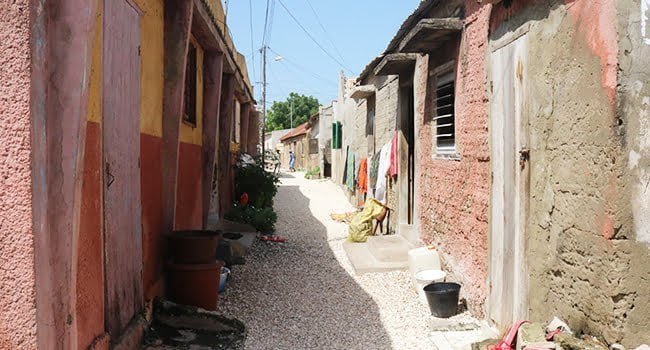
Impossible Choices – questioning assumptions behind lock-down in low income and fragile contexts
Blog Post
“The COVID-19 pandemic will have devastating consequences on people’s livelihoods and employment, especially in post-fragile, crisis and post-crisis environments.” Global Humanitarian Response Plan: COVID-19 Over the last few weeks we’ve seen significant discussion on the CALP Network d-groups and...
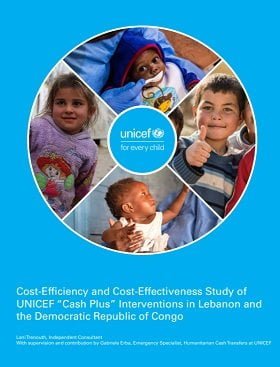
Cost-Efficiency and Cost-Effectiveness Study of UNICEF “Cash Plus” Interventions in Lebanon and the Democratic Republic of Congo.
Policy paper
The combination of basic services delivery and cash transfers is known among humanitarian practitioner as “cash plus”. This approach represents a solid comparative advantage for UNICEF considering its footprint in basic services delivery as well as its commitment to scale up humanitarian cash...
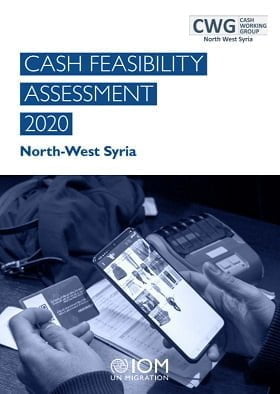
Cash Feasibility Assessment for NorthWest Syria
Report
The objective of this cash feasibility assessment for northwest Syria is to provide evidence-based, structured analysis of the various dimensions that make cash and vouchers interventions feasible. The primary audience for this document are all the organizations either currently involved in cash-based...

CVA for health outcomes
Webinar
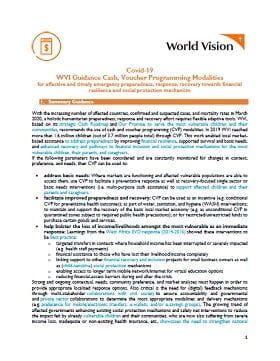
Covid-19 WVI Cash, Voucher Programming Modalities
Guidelines and Tools
With the increasing number of affected countries, confirmed and suspected cases, and mortality rates in March 2020, a holistic humanitarian preparedness, response and recovery effort requires flexible adaptive tools. WVI, based on its strategic Cash Roadmap and Our Promise to serve the most vulnerable...

Guidance Note on The Role of Cash and Voucher Assistance to Reduce Financial Barriers in the Response to the COVID-19 Pandemic, in Countries Targeted by the Global Humanitarian Response Plan COVID-19
Guidelines and Tools
The reality is that often people still have direct and indirect healthcare expenditures. This paper will explore different options to address these, and where to consider CVA options. The paper will also give general guidance to other sectors on how to apply epidemic mitigation measures while maintaining...
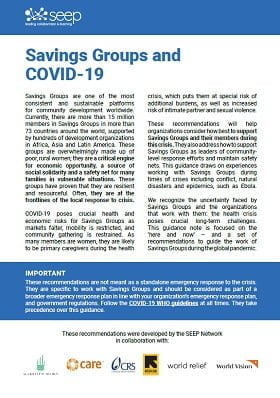
Savings Groups and COVID-19
Guidelines and Tools
COVID-19 poses crucial health and economic risks for Savings Groups as
markets falter, mobility is restricted, and community gathering is restrained. As many members are women, they are likely
to be primary caregivers during the health crisis, which puts them at special risk of additional burdens, as well...
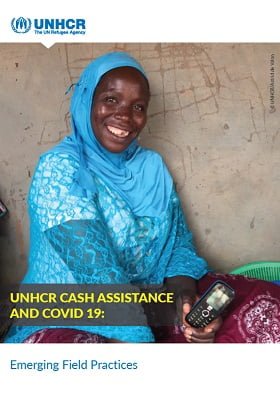
UNHCR Cash Assistance and Covid 19: Emerging field practices
Guidelines and Tools
This document is a snapshot of the many innovative field practices emerging in light of COVID-19.
UNHCR preparedness and response to COVID-19 is comprehensive including cash assistance as quick and efficient means of getting assistance to people fast, empowering families to deal with the crisis and meet...
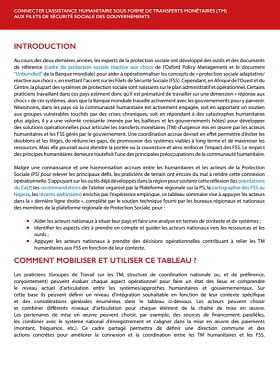
Connecter l’Assistance Humanitaire sous forme de Transferts Monétaires (TM) aux Filets de Sécurité Sociale des Gouvernements
Guides et outils
Ce document élaboré par la Plateforme Régionale pour la Protection Sociale vise à : Aider les acteurs nationaux à situer leur pays et faire une analyse en termes de contexte et de systèmes ; Identifier les aspects clés à prendre en compte et guider les acteurs nationaux vers les ressources et les...

Fiche conseils sur la coordination des transferts monétaires
Guides et outils
Les Transferts Monétaires (TM) représentent une part croissante de la réponse humanitaire globale, avec un montant estimé à 4,7 milliards de dollars distribués dans le monde en 2018, contre 2,8 milliards de dollars en 2016. Dans ce contexte, une coordination efficace des TM est un élément de plus...

Statement on Likely Impacts of COVID-19 on Humanitarian Cash Transfers in Yemen
Report
The COVID-19 pandemic has now spread to the Middle East. Countries across the region are imposing measures to prevent further spread of the virus. Currently there are no confirmed cases in Yemen, but it is highly likely that COVID-19 will eventually reach the country. Organizations are shifting funding...

CCD Social Protection Working Group: Advocacy in response to COVID-19
Policy paper
The need for social protection in response to COVID-19: COVID-19 has an unprecedented impact globally in terms of access to and the capacity of healthcare systems to respond. The health crisis is yet to peak in many countries and in low income contexts, the concern is that its impact will be severe where...
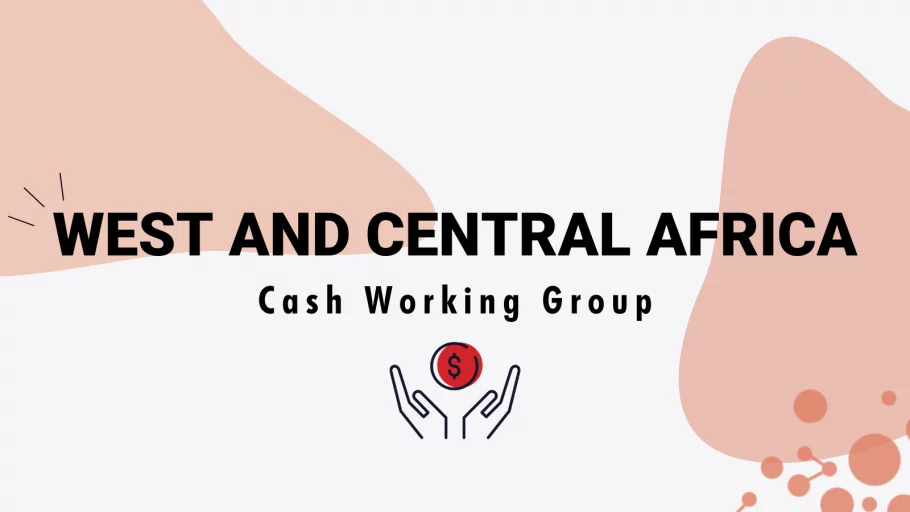
Minutes and recording from the WCAF regional CWG – 1 April 2020
Meeting minutes
Meeting on CVA and COVID19
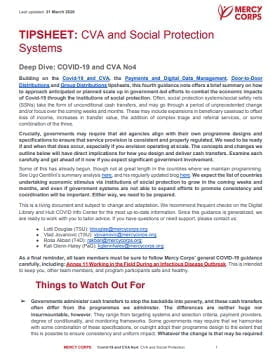
Tipsheet: CVA and social protection systems (COVID-19)
Guidelines and Tools
Building on the Covid-19 and CVA, the Payments and Digital Data Management, Door-to-Door Distributions and Group Distributions tipsheets, this fourth guidance note offers a brief summary on how to approach anticipated or planned scale up in government-led efforts to combat the economic impacts of Covid-19...
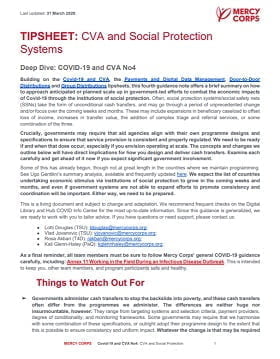
Mercy Corps’ tipsheet No 4: CVA and Social Protection Systems
Guidelines and Tools
Mercy Corps’ Tipsheet 4 – CVA and Social Protection Systems
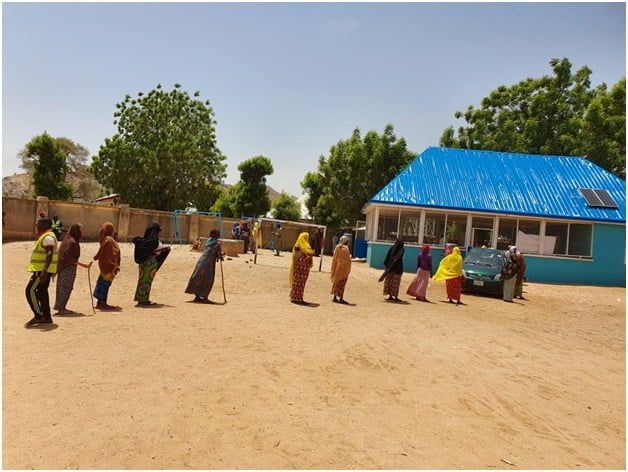
COVID-19 and CVA: how are operational actors responding?
Blog Post
“The COVID-19 pandemic will have devastating consequences on people’s livelihoods and employment, especially in post-fragile, crisis and post-crisis environments.” Global Humanitarian Response Plan: COVID-19 We don’t yet know exactly how the COVID-19 pandemic will be experienced by the world’s...
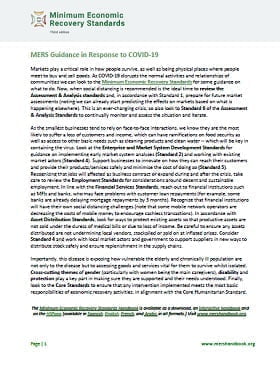
MERS Guidance in Response to COVID-19
Guidelines and Tools
Markets play a critical role in how people survive, as well as being physical places where people meet to buy and sell goods. As COVID-19 disrupts the normal activities and relationships of communities we can look to the Minimum Economic Recovery Standards for some guidance on what to do. Now, when social...

Looking into 2020: short overview on global clusters, CVA and the CALP Network
Presentation
Overview as 2020 begins:
• Significant progress and commitment from all global clusters on integration of CVA into their work.
• Significant interest in different regions and by some donors on sector-specific CVA.
• Challenges that remain:
o Dialogue: 1) Ensuring CVA specialists...
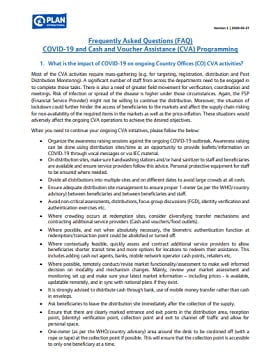
Frequently Asked Questions (FAQ) – COVID-19 and Cash and Voucher Assistance (CVA) Programming
Guidelines and Tools
This document has enlisted some key questions and their possible solutions in relation to COVID-19 response through cash and/or vouchers. This is a live document, which will be updated periodically.